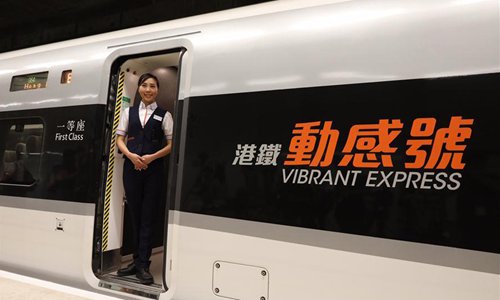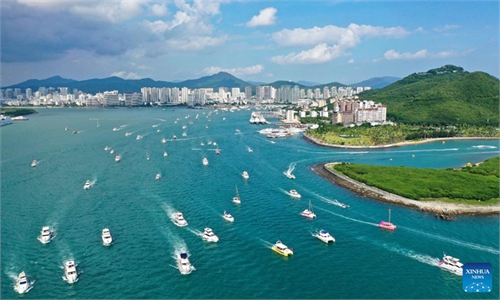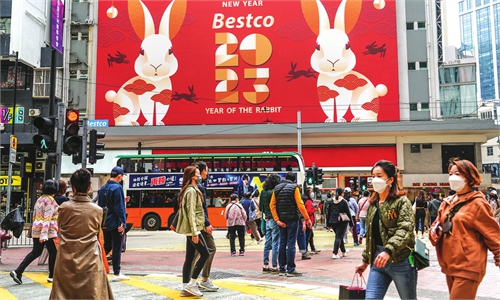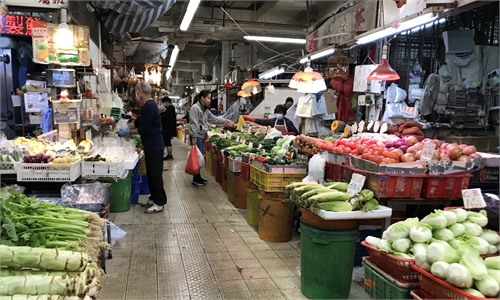West Kowloon Station port celebrates 6th anniversary, as passengers embrace Guangzhou-Shenzhen-Hong Kong Express Rail Link

An attendant is seen on a train of the Guangzhou-Shenzhen-Hong Kong Express Rail Link (XRL), in Hong Kong, south China, Aug. 16, 2018. The trial run of the Hong Kong Section of XRL has been completed on Thursday. The 26-km Hong Kong section of the XRL links up Hong Kong with the mega high-speed rail network of the Chinese mainland. (Xinhua/Lui Siu Wai)
The port at the West Kowloon Station, the Hong Kong terminus of the Guangzhou-Shenzhen-Hong Kong Express Rail Link (Guang-Shen-Gang XRL) celebrated its 6th anniversary on Monday.The passenger traffic between Hong Kong and the Chinese mainland has constantly hit new records during the past six years, significantly enhancing connectivity across the Guangdong-Hong Kong-Macao Greater Bay Area.
Passenger trips the Guang-Shen-Gang XRL has accumulated reached over 62.8 million. Daily passenger traffic has repeatedly set new records, with the peak hitting 121,000 passenger trips.
The Guang-Shen-Gang XRL was launched in 2018. One Hong Kong resident surnamed Luo told the Global Times on Tuesday that the high-speed railway is popular among locals for its convenience, speed, and lower cost, compared to driving the same distance.
"I traveled from Hong Kong West Kowloon to Guangzhou and it cost 200 yuan ($28) and just one hour, while driving a car would take 3.5 hours," Luo said.
"During holidays, it's even harder to get a train ticket. Last Chinese New Year, I tried to book a train to Quanzhou, in East China's Fujian Province, but the tickets sold out the moment they went on sale," she added.
A PhD student, Huang Yujie, who studies in Hong Kong and dwells in Shenzhen, commutes between the two cities twice a week via Guang-Shen-Gang XRL. "I often book my train ticket one or two days in advance, except for holidays. It's convenient, comfortable and cost-effective," Huang said.
"When I travel from Shenzhen to Hong Kong, the high-speed train cuts my travel time, making same-day return easy," a Shenzhen resident Li Wenzhen told the Global Times on Tuesday. "It saves the cost of staying a night in Hong Kong, as the return train back to Shenzhen costs just half an hour."
Currently, starting from Hong Kong's West Kowloon Station, travelers can reach 79 Chinese mainland destinations.
"The high-speed train is more than just an infrastructure project. It plays a vital role in saving time, fostering economic growth, and strengthening connection across the Greater Bay Area. Its contribution to the region's integrated and coordinated development has been invaluable," Wang Jinwei, a professor at the School of Tourism Sciences at Beijing International Studies University, told the Global Times on Tuesday.
The West Kowloon Station has processed 700,000 foreign passenger trips so far this year, a 104-percent increase year-on-year.
Nearly 100,000 of the foreign visitors entered the Chinese mainland under the special visa-free policy arrangement, meaning one in seven overseas travelers has benefited from the visa-free entry --16.3 times higher than the same period last year, according to data from Shenzhen General Station of Immigration Inspection.
"Overseas visitors can enter the mainland via China's special administrative regions Hong Kong and Macao (SARs), making SARs key gateways to the mainland, ensuring a smoother travel experience," Wang said.
"The six-year operation of the Guang-Shen-Gang XRL has seen remarkable success and gained high acclaim from tourists. To further boost regional economic development and integration, the XRL will continue to improve service, with plans to expand routes and offer more competitive pricing," Wang added.



